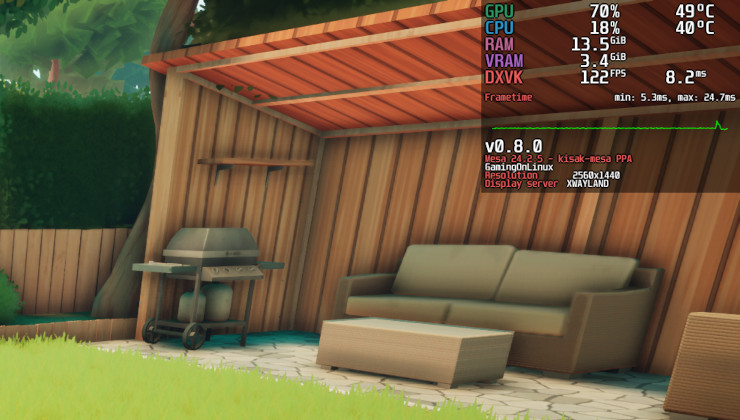It's finally here in Alpha, Google and Valve have brought Steam to ChromeOS giving even more platforms using Linux a chance to get their gaming on.
This is another huge step for Linux gaming. Even though ChromeOS isn't exactly a traditional Linux distribution, the Steam client on it is still pretty much the same as the one available for Linux desktops and runs inside Google's special "borealis" Linux container.
Announced during the Google for Games Developer Summit 2022 Keynote, they said it's available for "select" Chromebooks for users to try.
They said to check out info on their community forum, which actually has nothing posted on it right now. Will update when it does with what info they provide. More to come…
Update — their post on the Chromebook community forum is now live, but it still doesn't actually give any info:
As you may have already heard, our team is working with Valve to bring Steam to Chrome OS. We are very excited to share that we’ll be landing an early, alpha-quality version of Steam on Chrome OS in the Dev channel for a small set of Chromebooks coming soon. Please come back to the forum for more information!
One can hope...
- 11th generation Core i5 and i7
- Have at least 7Gb of ram
- Specific boards only
Source: [About Chromebooks](https://www.aboutchromebooks.com/news/steam-gaming-on-chromebooks-hardware-requirements/)
Last edited by Jpxe on 15 Mar 2022 at 5:41 pm UTC
I hope both Google and Valve are working closely and sponsoring open source projects for running x86 code on ARM. Would be great for both Chromebooks and future Steam Decks.
Having an arm chromebook (lenovo duet) I can say, not really. Closed source drivers don't offer desktop gl (mine is limited to 2.1), and even if they do have vulkan and opengles (i.e. 3.2) that does not mean it gets exposed to the linux container. Again in the case of the duet, I only get OpenGL 3.1 (and not 3.2) and no vulkan (because the venus virt-io does not work for arm atm). In any case the open source drivers are not really better for gaming.
You can use box86/box64 with some success depending on the game but chromeos layers also get in the way.
great now things can run inside pressure vessel container inside borealis container...
or maybe inside proton inside borealis...
I hope both Google and Valve are working closely with and sponsoring open source projects for running x86 code on ARM. Would be great for both Chromebooks and future Steam Decks.
i dont know how good that would be, unless we were willing to completely give up on accuracy we wouldnt have any modern system:
https://arstechnica.com/gaming/2011/08/accuracy-takes-power-one-mans-3ghz-quest-to-build-a-perfect-snes-emulator/
that said, the margin for bugs running proton/wine under arm would grow exponentially, it might not be an great issue for steam games, but for everything else, doing the QA ourselves will be hell, dont expect to play any obscure indie game on that thing.
that said, amazon will contribute too in theory, at least with proton/wine, not sure with the arm version of those.
i think our biggest bet at an arm migration would be give up on local gaming and use cloud instead, wich would be an sad ending for freedom.
Next up, streaming Steam games using Stadia's technology.
One can hope...
Do not limit yourself to Steam , do not be a slave to just one store , Stadia is independent from other stores and in the short term it looks bad , but in the long term it will allow a better service , more profitable and with that a better investment in hardware , and more optimized and scalable, a 100% cloud platform is a better implementation than adaptations
And best of all, all running Linux.
Believe in the power of Linux on servers.
Last edited by henriquecarioca on 16 Mar 2022 at 3:13 am UTC
To be honest, I think you are overoptimistic about Stadia. At this point, I think their new project to do a Wine-like thing for games is too little, too late. In theory, they could decide to put plenty of muscle behind it, use the new compatibility layer to do a massive push for way more games on the platform because that way it's far easier for the developers, put in a stack of marketing and do a big re-launch with better and better communicated terms of service, and maybe put this thing over the top.Next up, streaming Steam games using Stadia's technology.
One can hope...
Do not limit yourself to Steam , do not be a slave to just one store , Stadia is independent from other stores and in the short term it looks bad , but in the long term it will allow a better service , more profitable and with that a better investment in hardware , and more optimized and scalable, a 100% cloud platform is a better implementation than adaptations
And best of all, all running Linux.
Believe in the power of Linux on servers.
But I don't think they are likely to have the internal political will to do that.
Do not limit yourself to Steam , do not be a slave to just one store, Stadia is independent from other stores and in the short term it looks bad , but in the long term it will allow a better service , more profitable and with that a better investment in hardware , and more optimized and scalable, a 100% cloud platform is a better implementation than adaptations
And best of all, all running Linux.
Believe in the power of Linux on servers.
I already have a great streaming experience on Stadia, now I would like a Stadia-like experience on Steam, where I have some 80% of my games. I don't want a store-agnostic streaming service because I already have GFN and it's worse than Stadia on so many levels. I want a tightly-integrated Steam streaming experience; whether they use Stadia's tech or develop their own is secondary to me. I think it's a logical next step for SteamDeck, because not all AAA games, especially going forward, are going to run great - streaming could patch that hole.
Next up, streaming Steam games using Stadia's technology.
One can hope...
Do not limit yourself to Steam , do not be a slave to just one store , Stadia is independent from other stores and in the short term it looks bad , but in the long term it will allow a better service , more profitable and with that a better investment in hardware , and more optimized and scalable, a 100% cloud platform is a better implementation than adaptations
And best of all, all running Linux.
Believe in the power of Linux on servers.
For real? You understand well that to use Stadia you must necessarily have a decent Internet connection, which not everyone has, and you would be a slave to Stadia and the internet connection, I hope that the future of Linux is not this. I don't see any freedom in streaming ... that's my opinion of course ...
Last edited by ghiuma on 16 Mar 2022 at 11:10 am UTC
Will this help Steam run on other ARM distros and hardware such as a RockPro64 on Manjaro ARM ? Would be my only interest here.
Chromebooks are x86, at least for latest generations. So no, this is purely some container work by Google, on x86 for x86. Might still help Linux though, especially with students using that a lot.
IMHO, Steam on ARM seem to still be very far to me, apple's MX chips excepted perhaps, but that's a very specific case.
Steam on Linux on ARM => https://gitlab.steamos.cloud/steamrt/steam-runtime-tools/-/issues/81Wonder how this leads to there being a native version for m1 Macs. It's a little crusty (the Mac Steam version). Of course it doesn't help that huge swaths of my Steam Library are unusable because of Apple ditching 32bit support....















 How to set, change and reset your SteamOS / Steam Deck desktop sudo password
How to set, change and reset your SteamOS / Steam Deck desktop sudo password How to set up Decky Loader on Steam Deck / SteamOS for easy plugins
How to set up Decky Loader on Steam Deck / SteamOS for easy plugins
See more from me